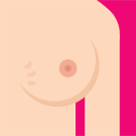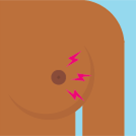How do I schedule a breast cancer screening and mammogram at NYC Health + Hospitals?
- Please call 1-844-692-4692 to schedule a breast cancer screening and mammogram.
- You can see a doctor in the Bronx, Brooklyn, Manhattan, Queens or Staten Island.
- If you already have a primary care doctor at a NYC Health + Hospitals or Gotham Health clinic or health center, they can help you set up an appointment for a screening and a mammogram.
Download our brochure: What You Need to Know About Breast Cancer
English | Español | Shqip | االعربية | বাংলা | Français | Kreyòl Ayisyen | हिंदी | 한국어 | Polski | Русский | 简体中文 | 繁體中文 | اُردُو
Warning Signs of Breast Cancer
Some women have signs and symptoms of breast cancer and some women do not. Breast cancer symptoms may include:

A new lump in
the breast or
underarm

Thickening or
swelling of part of the breast

Dimpling
breast skin

Redness or
flaky skin in the
nipple area or
the breast

A nipple that
turns in or
becomes
sunken

Pain
in the chest
If you have any of these symptoms please tell your doctor immediately or call us at 1-844-692-4692 to set up a screening.
What age should I get screened for breast cancer?
- Women aged 50 to 74 years old should be screened for breast cancer and get a mammogram every two years.
- Women 40 to 49 and over 74 should talk to their doctor and decide whether to have breast cancer screening.
How Can I Find Out if I Have Breast Cancer?
- A doctor will first speak to you about any breast cancer symptoms you might have.
- After a physical examination, your doctor will determine if a screening test called a mammogram is necessary.
- Mammograms are X-ray pictures of the breast that allow doctors to look for early signs of breast cancer.
What to Expect During a Mammogram
- Your breast will be compressed between two plates for a few seconds.
- The procedure does not hurt. You might feel some discomfort.
- The X-ray machine uses very low doses of radiation to take pictures of your breast.
- The entire procedure will last about 20 minutes.
COVID-19 Safety Precautions for breast cancer screenings
- All patients and visitors must wear face coverings when they come in for a screening and mammogram.
- When you arrive, we will check your temperature and ask if you have COVID-19 symptoms.
- Patients with a high temperature or fever will not be allowed in our buildings.
- Registration areas and waiting rooms have been changed to allow social distance.
- All of our doctors, health care staff and radiology technicians who perform mammograms will wear face coverings and appropriate personal protective equipment (PPE).
- We will clean all spaces and mammogram machines after each patient visit.
How much does it cost?
There are many ways to cover the cost of breast cancer screening and mammograms. If you do not have health insurance, we can still screen you for breast cancer and give you a mammogram.
- Most health insurances cover health screenings for breast cancer and mammograms. Depending on your health insurance, you might have a copay.
- We can help you apply for health insurance. Call 1-844-692-4692 to speak to someone who can help you get health insurance.
- If you do not qualify for health insurance we can help you enroll in NYC Care. NYC Care is a health access program that works like insurance. Learn more
Reduce Your Risk of Breast Cancer
Living a healthy life from an early age can help reduce your chances of getting breast cancer. Here is a list of good habits to develop:
- Eat healthy foods
- Maintain a healthy weight
- Get regular exercise
- If you smoke, try to quit
- Limit alcohol use
- Breastfeed your children
- Ask your doctor about the risks of taking hormone replacement therapy or birth control pills
- Limit exposure to radiation from medical imaging tests like X-rays, CT scans, and PET scans
